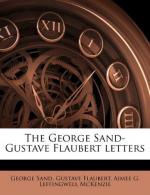|
This section contains 6,164 words (approx. 21 pages at 300 words per page) |

|
SOURCE: Wise, Christopher. “The Whatness of Loulou: Allegories of Thomism in Flaubert.” Religion and Literature 25, no. 1 (spring 1993): 35-49.
In the following essay, Wise investigates how the philosophical thought of Thomas Aquinas infused Flaubert's fiction, especially “Un Coeur simple,” and rejects his classification as a postmodern author.
It is well known that the philosophy of Thomas Aquinas had a significant impact upon James Joyce, especially in shaping Joyce's earliest published fiction, Dubliners (1914) and A Portrait of the Artist as a Young Man (1916); and, it is equally well known that Joyce was profoundly influenced by the novels of Gustave Flaubert, especially L'éducation sentimentale (1869), of which Joyce claimed to have memorized entire chapters. However, the corresponding relationship between Aquinas and Flaubert has been passed over in silence by literary scholars, when not prematurely obviated as either theoretically untenable or historically groundless.1 In the essay to follow, while I will not...
|
This section contains 6,164 words (approx. 21 pages at 300 words per page) |

|


